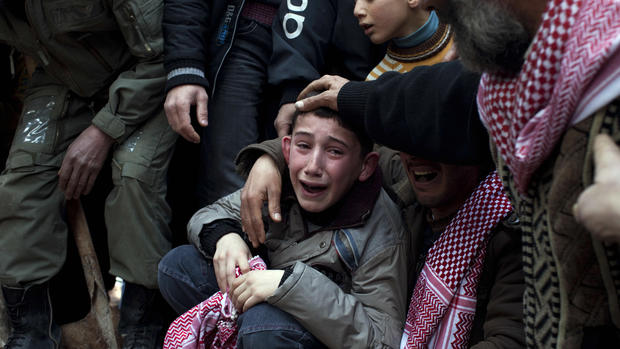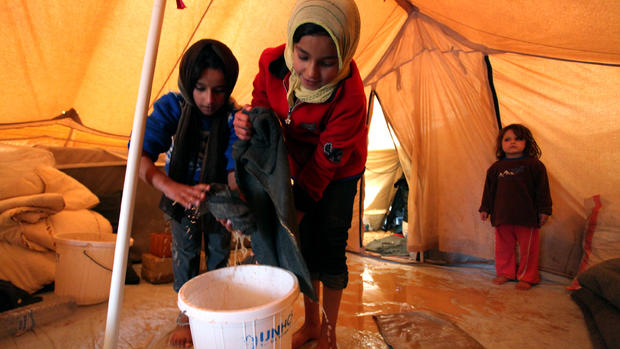Mortars strike Damascus; regime claims progress in key city
DAMASCUS, Syria Mortar rounds struck several areas of Damascus on Tuesday, killing up to four people, a government official said, while anti-regime activists said Syrian troops seized control of a neighborhood in the central city of Homs that is considered a symbol of opposition to President Bashar Assad's regime.
The Syrian military's recapture of Baba Amr came as opposition representatives took the country's seat for the first time at an Arab League summit, a significant diplomatic boost for the rebellion.
The seesaw fight for the Homs neighborhood reflects the back-and-forth nature of Syria's 2-year-old civil war. While rebels appear to be gaining ground, their progress is slow and their fighters remain vulnerable to Assad's military superiority.
The regime has ample heavy weapons and a fleet of fighter jets but a shortage of ground troops, meaning it often abandons areas to rebel forces and then pounds them with artillery and airstrikes from afar, sometimes forcing rebel retreats. It also frequently claims to have "secured" areas only to report months later that it "secured" them again, with little explanation of how rebels got back in.
In Damascus, the SANA state news agency said mortar shells exploded in several parts of the city, killing at least three people and wounding others. Most of the strikes hit the city's east side, falling near a school in the Baramkeh neighborhood, the Damascus Hospital, the Law Faculty of Damascus University and the state news agency's own offices.
- U.N. reducing international staff in Damascus
- Obama seeks new aid for Jordan's Syrian refugee crisis
- Inside a Syrian refugee camp
A government official told The Associated Press that four people had been killed and more than 40 wounded. The official spoken on condition of anonymity since he was not authorized to brief the media.
SANA said one girl and two other civilians were killed.
Mortar rounds also fell in a number of areas on the city's west side, including the Christian neighborhood of Bab Touma, SANA said.
The agency published photos of a hole in a wall of what appeared to be a school, medics treating blood-stained patients and firemen extinguishing burning cars.
It was not immediately clear who fired the mortars. Such sporadic attacks in the capital have grown more common in recent weeks as rebels have continued to clash with government troops on the city's east and south sides. While the shelling rarely causes many casualties, it has shattered the aura of normalcy the regime has tried to cultivate in Damascus.
SANA also reported the explosion of a car bomb near the predominately Kurdish neighborhood of Rukneddine. It gave no further details.
The government blamed "terrorists" for all the attacks, its blanket term for anti-Assad forces.
Also Tuesday, the Britain-based Syrian Observatory for Human Rights said that government forces pushed rebels from the Baba Amr neighborhood of Homs after two weeks of clashes, shelling and airstrikes that destroyed many homes.
The state news agency said Monday that government forces had "restored security and stability" to the neighborhood.
A Homs-based government official confirmed to The Associated Press that regime troops took control of Baba Amr.
"Baba Amr is now a safe area," he said, speaking on condition of anonymity because he was not authorized to give official statements. He said clashes continued elsewhere in Homs.
Baba Amr, a poor, predominantly Sunni neighborhood in southwest Homs, emerged early in the uprising as a symbol of the rebel movement, first for its protests and later for the armed groups who held it against the regime onslaught.
While not strategically important in the civil war, the loss of Baba Amr is a symbolic blow to the rebels.
The government seized the neighborhood about a year ago after months of daily shelling that damaged much of the area and killed hundreds, including two foreign journalists who had sneaked in to report on the siege. It has changed hands a number of times since, with rebels saying early this month that they had taken advantage of a regime security lapse to take it back and set up checkpoints.
Also Tuesday, the Observatory said that at least 13 charred bodies, including those of four children and five women, were found on the outskirts of the village of Abil, southwest of Homs city.
The group, which relies on a network of contacts inside Syria, circulated a video that showed charred and disfigured bodies placed on sheets. Some had holes in their heads and others appeared to have had their throats slit.
The video appeared authentic and corresponded with other reporting by The Associated Press.
The Observatory said local activists blamed the killings on pro-government thugs.
The Syrian government does not respond to requests for comment and did not mention the killing in official media.
Meanwhile, at the Arab League summit in Qatar, a delegation led by the former president of the main opposition alliance, Mouaz al-Khatib, took the seats assigned for Syria to the applause of other delegates.
The decision for the Western-backed Syrian National Coalition to take Syria's seat was made at the recommendation of Arab foreign ministers meeting earlier this week in the Qatari capital, Doha. The Arab League in 2011 suspended the Syrian government's membership in the organization in response to the regime's crackdown on opponents.
The diplomatic triumph, however, could not conceal the disarray within the top ranks of the Syrian opposition.
Besides al-Khatib, the Syrian delegation included Ghassan Hitto, the recently elected prime minister of a planned interim government to administer rebel-held areas in Syria, and two prominent opposition figures, George Sabra and Suheir Atassi.
Addressing the gathering, al-Khatib thanked the Arab League for granting the seat to the opposition, saying "it is part of the restoration of legitimacy that the people of Syria have long been robbed of."
Even as rebel fighters gain ground in their fight against Assad's troops, their mostly exile political leadership has been crippled by infighting. Al-Khatib announced his resignation on Sunday because of what he described as restrictions on his work and frustration with the level of international aid for the opposition. The Coalition rejected the resignation and al-Khatib said he would discuss the issue later and represent the opposition at the Qatar summit "in the name of the Syrian people."
Hitto's own election as the head of the interim government also has triggered a backlash, with the head of the military council associated with the Coalition, Gen. Salim Idris, rejecting Hitto's nomination.
Some members have accused Qatar and the Syrian Muslim Brotherhood of imposing their will on the Coalition.
In Damascus, the government on Tuesday blasted the Arab League's move to allow the opposition to take its seat at the Doha summit, portraying it a selling-out of Arab identity to please Israel and the United States.
The crisis began in March 2011 with protests demanding Assad's ouster. With a harsh government crackdown, the uprising steadily grew more violent until it became a full-fledged civil war. The United Nations estimates that more than 70,000 people have died so far in the conflict.

